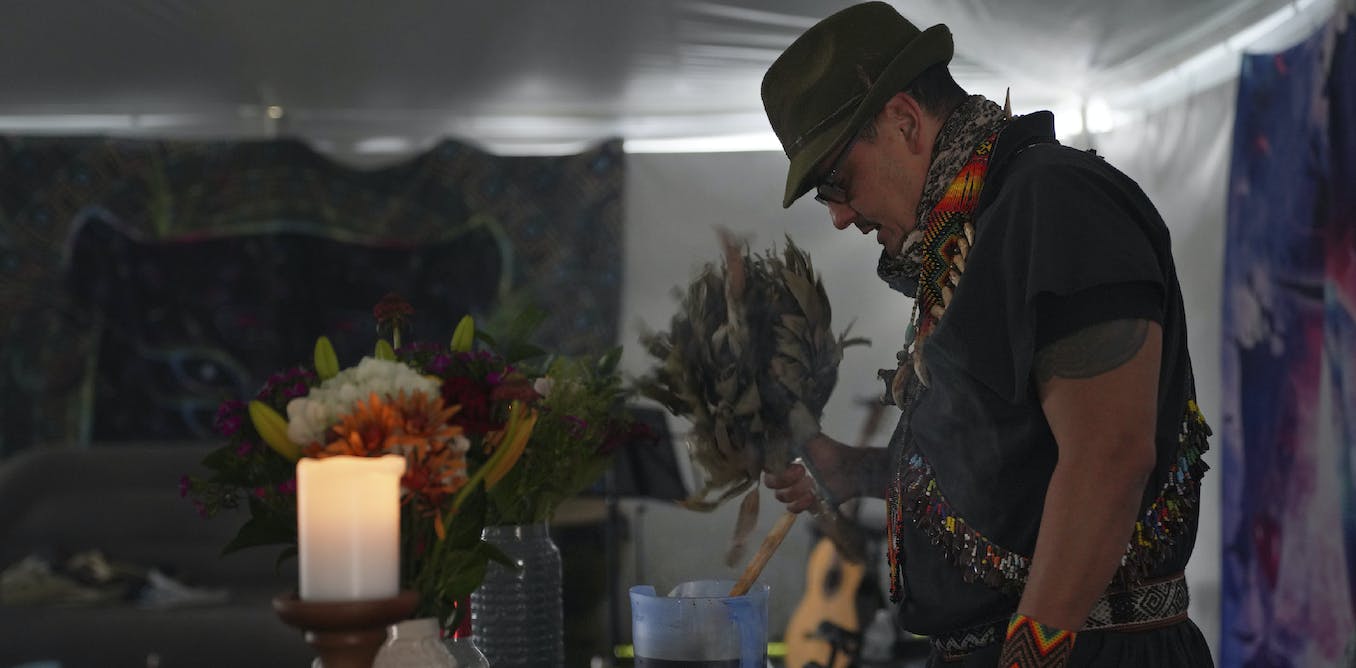More and more surveys point to decreasing membership in religious institutions and a corresponding rise of “nones.” Many people might assume that this indicates the absence of belief or a lack of spirituality.
Particularly in the West, people tend to think about religion in terms of belief in a higher power, such as God. For many nones, however, spirituality does not need a god or the supernatural to address questions of purpose, meaning, belonging and well-being.
While abandoning mainstream religious affiliation, many turn to alternative expressions, including secular, atheist and psychedelic churches.
For about a decade, as a scholar who studies alternative expressions of spirituality, I have tracked these groups online, visited churches and interacted with attendees. At times, I have been able to attend services or simply visit locations. At other times, out of respect for participants, I have met members – but not during services and rituals.
These churches demonstrate not a rejection of religion, as surveys suggest, but continued interest in spiritual community, rituals and virtues. Psychedelic churches
One such church is The Divine Assembly, or TDA, in Salt Lake City, Utah. Founded in 2020 as “a magic mushroom church” by Steve Urquhart, a former member of The Church of Jesus Christ of Latter-day Saints, TDA conducts worship that connects people without dogma or intermediaries. TDA is not atheistic but maintains an inclusive notion of belief regarding God or a higher power.
Where members depart from traditional notions of religion and church, however, is within their practices and aims. Through psychedelic drugs, members believe they can directly experience the divine – as they define it – while gaining insight into their own and others’ well-being. Within the church, members participate in collective meaning-making rituals that fortify their everyday lives.
Distinctly, using psilocybin is not part of these activities, nor are instructions provided on conducting mushroom ceremonies. This is done on one’s own time, according to individual practices.
Through the church, members participate in practices to help cultivate the value of psychedelic exploration. These include a range of activities, from ice baths to meditation in a room with flashing lights. TDA also offers courses on growing psilocybin through its educational initiative “shroomiversity.”
To borrow from its stated mission, TDA works to connect “people to self, others and the Divine.” It also seeks to “protect responsible and religious use of psilocybin, and cultivate health and healing.” This mission does not deny the place of belief but highlights broader therapeutic concerns.
Through shared rituals, members cultivate community while enhancing their total well-being.
Mushroom churches: an American tradition
Louisville, Kentucky’s Psanctuary Church brings “people together for healing and connection to divine revelation through communion with sacred mushrooms.” Nondenominational, Psanctuary defines itself as a “Constitutional Church.”
Indicating their legal status as a a nonprofit, tax-exempt, faith-based organization, Psanctuary situates itself as a uniquely American religion. For Psanctuary and other psychedelic churches, the use of psychedelics is simultaneously a sacred right and an expression of political freedom.
As with many psychedelic churches, Psanctuary is not atheistic. It understands divinity as “pure consciousness” that “permeates all being.” Positioned this way, religion moves away from monotheistic understandings of God.
Instead, it follows non-Western, indigenous and New Age understandings that view divinity as within everyone. It also reorients people from seeking salvation in a world to come by encouraging focus on the present.
Like TDA, religion for Psanctuary expresses the pursuit of “pure consciousness” as “the origin of health and well-being.” By experiencing this origin through psychedelics, members are “empowered to discover our own divinity.”
This dual emphasis on self-divinity and healing reflects common themes across psychedelic churches.
The Church of Ambrosia and Zide Door
Inspired by The Church of Ambrosia, a nondenominational, interfaith religion, Zide Door in Oakland, California, supports “the safe access and use of Entheogenic Plants.” Founded in 2019 by Dave Hodges, Zide Door affords space for members to “explore their spirituality.”
Commonly, mainstream religion requires believers to interact with the sacred through designated leaders or texts. At Zide Door and other psychedelic churches, the emphasis is on self-realization and interconnection through direct experience.
Psychedelics offer members firsthand access to religious understanding. Church, accordingly, becomes a place to support individual awakening.
Sacred Garden Community captures this shift. Also located in Oakland, SGC – as it announces on its website – is a “post-modern church” based on “faith of least dogma.” Through psychedelic sacraments, SGC claims to facilitate “direct experience of and relationship to Divine presence for individuals and community.”
Beyond the experience, SGC helps members integrate “the benefits” the “experience and relationship can bring” into everyday life. Like other psychedelic churches, SGC highlights how rejection of conventional religion is often accompanied by new avenues to pursue spirituality.
Ayahuasca churches and healing
Ayahuasca churches rely on indigenous understandings of ayahuasca, a plant-based psychedelic brew. For Indigenous people of South America, ayahuasca is a sacred rite based on local knowledge. They argue that removing ayahuasca from that context takes away its power and impact.
Indigenous practitioners and scholars thus warn about both the appropriation and commodification of indigenous practices. While such concerns should not be ignored, ayahuasca churches tell us much about contemporary religion.
The turn to ayahuasca rituals highlights the growing connection between spiritual needs and healing. The emergence of ayahuasca churches in the U.S. suggests that such healing requires the support of community.
California-based Hummingbird Church, for example, draws from ayahuasca rituals to provide “participants with opportunities to recharge their body, mind and soul with positive energy and reconnect with themselves.” Its “Statement of Faith” emphasizes this commitment to holistic healing.
It also situates the divine in “earthly” terms. Members, they believe, “should seek within Nature that which is contributory to our health and well-being.”
Located in Orlando, Florida, members of Soul Quest Ayahuasca Church of Mother Earth believe likewise. As members contend, “What is of the Earth is our holy sacrament.” Like others, they position psychedelics “as tools” that benefit “physical health, spiritual growth, and personal evolution.”
Through ayahuasca, members of both churches see psychedelic rituals as aiding in individual rejuvenation. Once rejuvenated, members believe they help restore nature or assist in another’s healing.
Well-being as spirituality
Collectively, these churches demonstrate not a rejection of religion, as the term “none” might suggest, but an embrace of well-being as spirituality.
And while they are distinct in many ways, they also share some common goals: They seek to provide members and practitioners ways to heal emotionally, psychologically and spiritually.
A key lesson members connect to psychedelics is the intrinsic sacredness of each person: The divine is not elsewhere but within everyone.
To be a none might reflect one’s total rejection of supernatural belief. But as psychedelic churches illustrate, identifying that way can also indicate spiritual pursuits that refuse to fit nicely within traditional religious categories.
While abandoning mainstream religious affiliation, many turn to alternative expressions, including secular, atheist and psychedelic churches. For about a decade, as a scholar who studies alternative expressions of spirituality, I have tracked these groups online
Atheists are not an “alternative expression of spirituality”. It is the absence of it. The same way drying is not an alternative form of watering plants.
No, it’s an absence of theism. Atheist. You can do psychedelics and talk about spirituality without believing in theism and gods.
So what do you call a person who doesn’t beleive in anything supernatural/spiritual/divine?
A realist
The religion called Scientism. Belief in the scientific method and its ability to explain all things.
That is still a belief system, as much as a spiritual system is.
Blind faith and the scientific method are literal opposites. What a bad take.
You have blind faith that the scientific method can explain all of reality. Your priests wear white lab coats and you fill your altars with arcane devices that you pretend can explain everything to you.
Yeah, it’s a religion.
Scientific method is not a blind faith lmao.
Blind faith is believing something without any proof. Scientific method is exactly the opposite of that. It is apparent that you don’t understand what you’re talking about.
Science is not a religion.
You have blind faith that the scientific method can explain all of reality.
Wrong. The scientific method is defined by the absence of blind faith.
That seems really condescending to religious people.
Religion isn’t just believing things without reasons, and epistemology (faulty or otherwise) is not religion.
Edit: Wonder if anyone is going to give a reason for downvoting that isn’t intentionally dense and a misrepresentation of my point? Guess not; we should definitely aim for less nuance in discussions.
Why should we pander to religious people? Wake up dude there’s no sky daddy lol.
Congrats, you solved the easiest puzzle in the universe.
Maybe you’ll realize one of these days that it isn’t what religion is about. I’m not pandering, I’m pointing out that OP was wrong and condescending to their own side.
Unless you think “scientism” is a real religion?
The context is: Alternative expressions of religious affiliation [which were explored, including atheism]. Which is why I included that quote in my comment.
Maybe I am too strict and you can read it in another way, where that list of things (including atheism) is not necessarily part of that next sentence. But the author should also take care to avoid such things.
I feel like adding a church into the equation unnecessarily complicates matters - get high at home.
Ok, you’ve convinced me.
I suspect your arm didn’t need much twisting.
In many places like the US, a “church” makes the psychedelics legal
I know organized communities often lead to a lot of social issues but they can also do a lot of good. Social support is key to mental healt. Modern lifestyle makes it harder and harder to find that support, or even meet new people after you get to a certain age
So this is why Walden was required reading in grade school; it’d have been crazy to go around thinking this was a new idea.
Ah yes, the musings of someone who could afford to just live in a summer cottage on a pond and chose to live simply without the risk of failure is a real inspiration for the common man.
“Nones”
What the hell is wrong with “agnostic?”
You don’t need to “fill the void”, there is no void to begin with.










